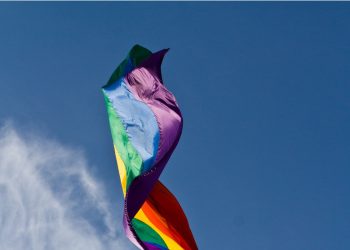A pink dress, with white polkadots, hangs in my cupboard at home. I bought it over a month ago, and even got it slightly altered to fit me better. I bought it before the run-up to Pink Dot exploded into a culture war of pink and white and red, and people who would never actually be personally affected by other people’s freedom to love decided that it was an affront to them and their religion for other human beings to strive for equal rights.
The dress is hanging in my cupboard at home while my friends are no doubt already gathered (or gathering – my friends aren’t always known for punctuality) in a sea of pink at Hong Lim Park because I am, once again, missing Pink Dot.
Since 2010 – which is when I first heard of and wanted to attend Pink Dot – I have only succeeded in being there once, in 2011. It was wonderful, friends, lovers and multi-generational families packed into the little park in the middle of the city. I’ve wanted to join in on another Pink Dot, but never quite made it because I always ended up, somehow or other, out of Singapore. This year is no different: despite all the anticipation and planning I am sitting here in Scotland, having had to catch a last-minute flight out to be with family.
Pink Dot is by no means a perfect event or movement. There is plenty that needs to be said about diversity and differences in experiences – straight or queer – in Singapore and around the world. But I still believe that Pink Dot is worth supporting, and it’s a belief that has been further reinforced by the outpouring of hatred and fear-mongering that has come from religious conservatives like Lawrence Khong and Ustaz Noor Deros.
It’s not a huge surprise. We’ve known for ages that Khong spends more time obsessing over gay sex than even gay people do. His anger, vomited all over obliging newspaper opinion pages, is fast getting repetitive and boring, especially to those who have never subscribed to as narrow an understanding of family as he.
What’s disappointing is the chorus of people who prize the avoidance of confrontation over the principle of equality and equal human rights. Let us not escalate the situation, they say. Let us not have confrontations in Singapore, that will disturb our carefully constructed and manicured law and order and harmony.
Interestingly, this argument is often framed in a way that portrays LGBT people and activists as the ones who are “escalating” the situation and “pushing their beliefs into people’s faces”. Some even go as far as to say that LGBT people in Singapore shouldn’t be so confrontational and vocal because it is “not that bad” in Singapore, even with S377A on the books. The onus is, for some reason, placed on the shoulders of LGBT activists to not be confrontational, while conservatives spew hate in the mainstream media in the name of religious freedom. The logic appears to be that LGBT people in Singapore should sit down and shut up because we are not Uganda.
I have seen comments accusing Pink Dot organisers of “escalating” the matter by engaging security personnel. In these comments there is little to no acknowledgement of the fact that there has been a surge of anti-gay rhetoric, and a strident campaign organised and supported by those who have referred to gay people as “cancers” and even opposed gay people’s access to health advice in the form of an HPB FAQ. There is little acknowledgement of the fact that such hatred can manifest ways that affect the safety of LGBT people in their everyday lives. There is little acknowledgement of the fact that the dehumanising rhetoric is not coming from Pink Dot, nor of the fact that Pink Dot organisers are not the ones who are advocating against the rights of religious conservatives.
Lawrence Khong and Ustaz Noor Deros can continue to be as religious and as conservative as they like regardless of whether Pink Dot goes ahead or not. Heck, they can even go on with their lives exactly as they want even if S377A is repealed. On the other hand, the campaigning against Pink Dot and LGBT activism has very real, everyday effects on LGBT people’s lives, depriving them of the rights that straight people enjoy and take for granted.
In the light of such determination to prevent sexual minorities from accessing their rights, a stubborn clinging on to “harmony” and avoidance of confrontation smacks of selfishness and privilege. Some people can afford to say that we shouldn’t have public protests or demonstrations in Singapore, mostly because they already enjoy the rights that these public assemblies are pushing for. What they fail to understand is that others cannot afford to remain silent. Oppressed minorities cannot afford to sit down and wait for a benevolent majority to grant them what should rightfully be theirs; things rarely work that way.
I hope that all my friends now sweating it out in Hong Lim Park are having fun. I hope that everyone – regardless of whether they are wearing pink, white, or all the colours of the rainbow – stays safe. I hope that people engage in debate and arguments based on principles of equality and human rights, rather than in physical violence. I have faith that they will, because I know that public demonstrations and assemblies aren’t synonymous with violence and chaos.
Above all, I hope that they never give up in pushing for their rights, their freedom to love, and their freedom to be who they are.


